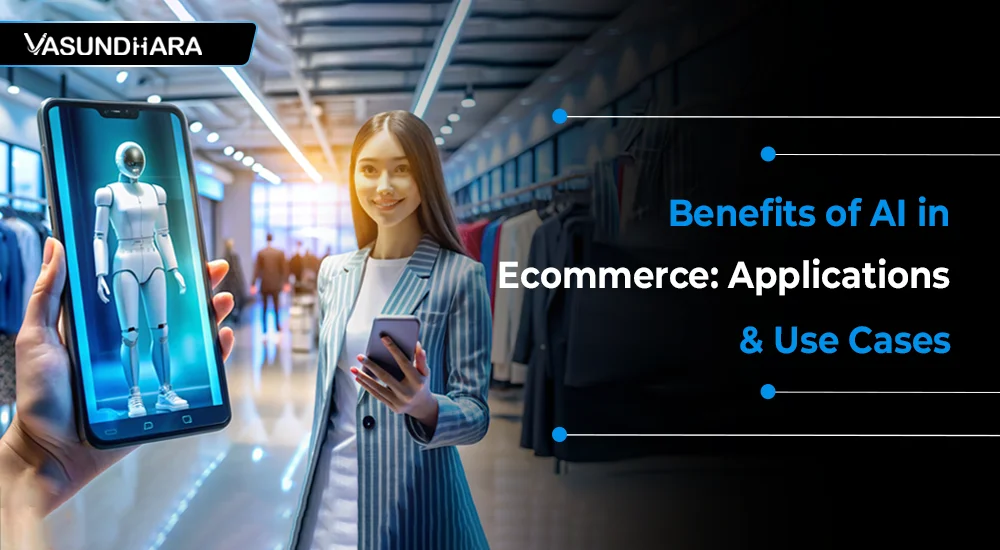Benefits of AI in E-commerce: Applications & Use Cases


- Nov 15, 2024



Artificial Intelligence (AI) is revolutionizing e-commerce, bringing unprecedented benefits to online businesses. From automating operations to improving customer experiences, AI has become an integral part of the e-commerce landscape. The ability of AI to analyze large volumes of data and make intelligent decisions enables e-commerce companies to gain a competitive edge.
The e-commerce industry is booming, and AI is at the heart of this transformation. AI technologies such as machine learning, natural language processing (NLP), and computer vision allow e-commerce platforms to create smarter, more efficient, and customer-centric solutions. AI's ability to analyze data in real-time, predict customer behavior, automate processes, and create personalized experiences has significantly impacted the way e-commerce businesses operate.
AI and e-commerce are not only helping businesses to enhance their sales and marketing efforts but also enabling them to optimize backend operations like inventory management, logistics, and customer service. This has led to improved efficiency, reduced costs, and increased profitability.
In this blog, we will explore the key benefits of AI in e-commerce, its applications, and real-world use cases that illustrate how AI is transforming the industry.
Also read: Top E-Commerce App Development Trends
Artificial Intelligence (AI) has become an integral part of the e-commerce landscape, transforming the way businesses operate and interact with their customers. AI’s ability to analyze vast amounts of data, automate tasks, and provide personalized experiences has made it a game-changer for online retailers.
The integration of AI in e-commerce is helping businesses streamline their processes, improve customer engagement, and drive revenue growth. Here are some of the key benefits of AI in e-commerce:
AI has redefined how e-commerce businesses interact with their customers, offering a more personalized and seamless shopping experience. AI-driven systems can analyze customer behavior and preferences, enabling businesses to anticipate customer needs and tailor their interactions accordingly.
This leads to higher customer satisfaction, increased engagement, and improved conversion rates.
One of the most widely known applications of AI in e-commerce is personalized product recommendations. AI algorithms analyze a customer’s browsing history, purchase history, and preferences to offer product suggestions that are highly relevant to each individual shopper.
Personalized recommendations drive up sales and improve the overall customer experience by making it easier for customers to find products they’re likely to be interested in.
AI can optimize inventory management by predicting demand patterns and ensuring the right amount of stock is available at the right time. Machine learning algorithms analyze historical sales data, seasonal trends, and other factors to forecast demand accurately.
This prevents overstocking and stockouts, leading to efficient resource utilization and reduced operational costs.
AI can help e-commerce businesses implement dynamic pricing strategies that maximize profitability. AI algorithms can analyze competitor pricing, customer behavior, and market conditions to automatically adjust prices in real-time.
This enables e-commerce platforms to offer competitive prices while maximizing profit margins.
AI plays a crucial role in optimizing supply chain management for e-commerce businesses. AI-powered systems can predict demand, manage logistics, and track shipments in real-time. These systems improve supply chain efficiency by identifying potential bottlenecks and suggesting alternative routes or delivery methods. The result is faster delivery times, reduced costs, and a smoother supply chain process.
Also read: Must-Have Features of E-commerce Mobile App In 2024
Artificial Intelligence (AI) is reshaping the e-commerce industry by streamlining operations, enhancing customer experiences, and driving business growth.
With its ability to process large amounts of data, learn from user behavior, and make real-time decisions, AI has become a key tool for e-commerce businesses to stay competitive. Below are some of the most significant applications of AI in e-commerce:
As mentioned earlier, AI is at the core of personalized product recommendations. By analyzing data on customer behavior and preferences, AI algorithms can suggest products that a customer is likely to purchase.
This improves cross-selling and upselling efforts, leading to increased sales for e-commerce platforms.
AI-powered chatbots and virtual assistants are transforming how e-commerce businesses engage with customers. These bots can answer questions, provide product information, assist with order placement, and offer personalized recommendations based on user preferences.
The use of chatbots has resulted in faster response times, improved customer satisfaction, and cost savings for businesses.
Traditional search engines often rely on keywords, but AI-powered search systems can understand the context and intent behind a user’s query. These intelligent search engines deliver more relevant results, helping customers find the right products faster.
AI can also improve filtering options, ensuring that customers can refine their searches with greater accuracy.
Also read: The Role of AI and ML in DevOps Transformation
E-commerce businesses face the constant threat of fraud, whether it’s payment fraud, account takeover, or fraudulent returns. AI systems can analyze vast amounts of transactional data in real-time to identify suspicious patterns and flag potential fraud. Machine learning models are trained to detect fraudulent activity and take proactive measures to prevent it, which helps protect both customers and businesses.
AI has revolutionized the way e-commerce businesses approach marketing and advertising. By analyzing customer data, AI can create highly targeted advertising campaigns that reach the right audience with the right message at the right time.
AI-powered marketing tools can predict which customers are most likely to make a purchase, allowing businesses to allocate their marketing budgets more effectively.
AI is also being used to generate and curate content for e-commerce websites. This includes everything from product descriptions and blog posts to social media content. AI tools can automatically generate content that is optimized for SEO, helping e-commerce businesses rank higher in search engine results and attract more organic traffic.
Also read: Must-Have Features of E-commerce Mobile App In 2024
Amazon has been at the forefront of AI adoption in e-commerce, and its personalized recommendation engine is a prime example of AI’s impact. Amazon uses AI algorithms to analyze customer browsing behavior and purchase history to recommend products that are most likely to appeal to each individual shopper.
This has contributed to Amazon’s massive success by driving repeat purchases and increasing average order values.
Shopify, a leading e-commerce platform, leverages AI to help its merchants optimize their marketing efforts. Shopify’s AI-driven tools analyze customer data to create personalized marketing campaigns that improve customer engagement and conversion rates.
These tools help merchants make data-driven decisions about how to allocate their marketing budgets for maximum ROI.
Alibaba, one of the world’s largest e-commerce platforms, uses AI to optimize its logistics operations. Alibaba’s smart logistics system uses AI to predict demand, manage warehouse operations, and route deliveries in real-time.
This has significantly improved delivery times and reduced operational costs, allowing Alibaba to offer faster and more efficient shipping to its customers.
eBay has introduced an AI-powered image search feature that allows customers to search for products using images. By uploading a photo of an item they’re interested in, customers can find similar products on eBay.
This feature is powered by AI-driven image recognition technology, making it easier for customers to find products they want, even if they don’t know the exact name or description.
Despite its numerous benefits, implementing AI in e-commerce comes with its own set of challenges. One of the biggest challenges is data privacy and security.
E-commerce businesses collect vast amounts of customer data, and ensuring that this data is protected from cyber threats is critical. Additionally, there is a risk that AI systems may make biased or inaccurate decisions if the data they are trained on is flawed.
Another challenge is the cost of implementing AI technologies. While AI can drive significant cost savings in the long run, the initial investment required to develop and deploy AI systems can be prohibitive for smaller e-commerce businesses.
Also read: What is Generative AI? Everything You Need to Know
As AI technologies continue to evolve, their impact on e-commerce will only grow. Future developments in AI will enable even more personalized and immersive shopping experiences, with innovations like virtual shopping assistants, augmented reality (AR), and virtual reality (VR) becoming more widespread. AI will also play a key role in enhancing supply chain automation, enabling faster and more efficient delivery processes.
Moreover, as AI continues to advance, AI development company will empower e-commerce businesses to leverage these technologies to better understand customer behavior, optimize marketing efforts, and improve operational efficiency..
Also read: How To Build An AI Software: A Comprehensive Guide
AI has become a driving force in the eCommerce industry, offering a wide range of benefits to businesses and customers alike. From personalized recommendations and dynamic pricing to enhanced customer support and efficient supply chain management, AI is transforming every aspect of the e-commerce experience.
While there are challenges to implementing AI, the potential rewards make it a worthwhile investment for e-commerce businesses looking to stay competitive in an increasingly digital world. As AI continues to advance, its applications in e-commerce will only expand, unlocking new opportunities for growth and innovation.
If you're ready to take your e-commerce business to the next level, investing in AI-powered e-commerce app development solutions is the way forward. From enhancing customer satisfaction to streamlining your internal processes, AI offers endless possibilities.
At Vasundhara Infotech, we specialize in developing innovative, AI-powered e-commerce apps tailored to your business needs. Our expert team will help you harness the power of AI to boost your sales, improve customer engagement, and enhance your overall digital presence.
Contact us today to learn how we can help transform your e-commerce platform with cutting-edge AI solutions. Let’s build a smarter, more profitable future for your business together.
Copyright © 2026 Vasundhara Infotech. All Rights Reserved.